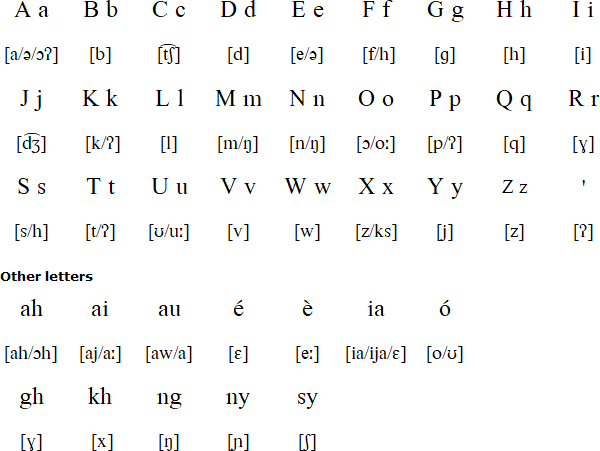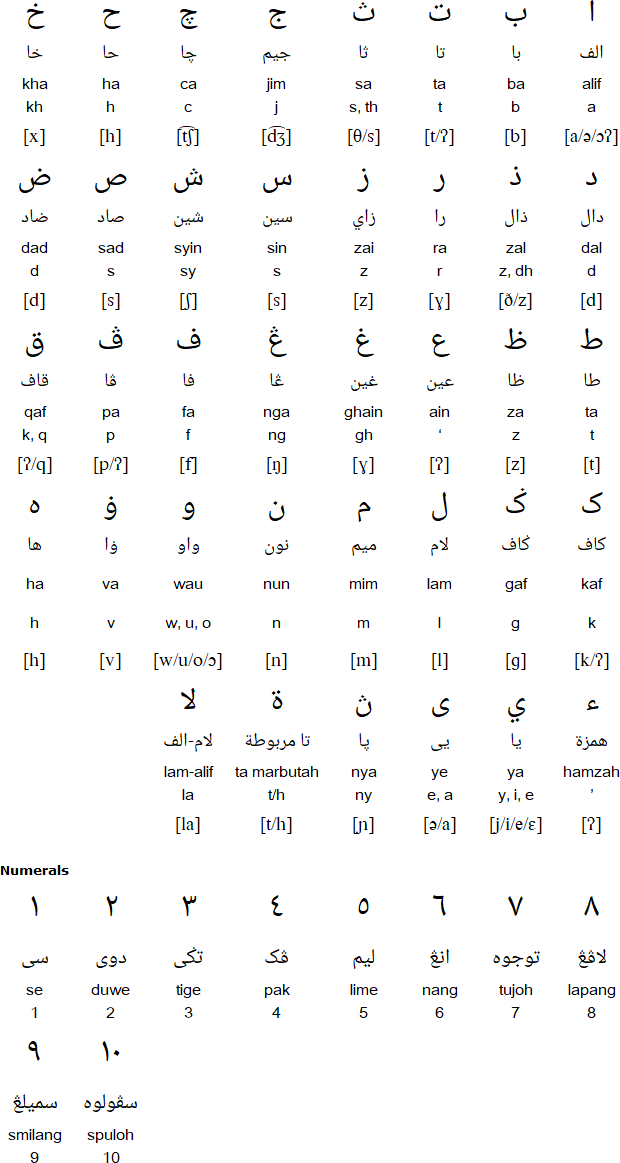Terengganu Malay is a Malayan language spoken by about 1.2 million people mainly in the state of Terengganu (Tranung) in eastern Peninsular Malaysia. There are also speakers of Terengganu Malay in the Malaysian states of Johor and Pahang
Although Terengganu Malay is generally considered a variety of Malay, it differs sufficiently from other Malay varieties in terms of vocabulary, grammar and pronunciation to be mutually unintelligible with them.
Terengganu Malay is known as Terengganu or Terengganuan in English, Bahasa Terengganu or Bahasa Melayu Terengganu in Malay, and Base Tranung, Bahse Tranung, Bahse Tghanung, Loghat Terengganu or Cakak Tranung in Terengganu Malay. There are two main dialects: Inland Terengganu Malay and Coastal Terengganu Malay.
Terengganu Malay is used in songs, poems and in films, TV shows and on radio stations. There are ways to write it with the Latin alphabet and with the Jawi (Arabic) alphabet, however there is no standard orthography.


Download alphabet charts for Terengganu Malay (Excel)
Budok-budok lening koho dok kena makanang tradisi, sohbeng kate kuey, nasik pong ttuko bimbo lagi, nok wak guane makanang lening modeng blake, oghang mude tak mboh belajo duk ngarak ke oghang tue sokmo.
A version of this text in the Jawi (Arabic) script
بودوک٢ لنيڠ کوهو دوک کينا ماکاناڠ تراديسي, سوهبيڠ کاتي کويي, ناسيک ڤوڠ توکو بيمبو لاݢي⹁ نوک واک ݢواني ماکاناڠ لنيڠ موديڠ بلاکي, اوغاڠ مودي تاک مبوه بيلاجو دوک ڠاراک کي اوغاڠ توي سوکمو.
Kids today don't know about traditional foods, it's not just traditional cakes, even the rice as well, what can we do all foods these days are modern, younger generations don't want to learn always rely on old people.
Source: https://en.wikipedia.org/wiki/Terengganu_Malay#Sample_Text
Sghume ma'nusie lahé-lahé je bebah, sameghate daghi segi kemulie'ang nge hok-hok ye. Maséng-maséng ade pikéghang nge pghasa'ang, kene tulóng antaghe satu same laéng nge smangak pesedaghe'ang.
Another version of this text
Segheme manusie lahér-lahér je bébah, sameghate daghi segi kemulieang nge hok-hok ye. Maséng-maséng ade ppikéghang nge peghasaang, kene tulong antaghe satu same laéng nge semangak pesedagheang.
A version of this text in the Jawi (Arabic) script
سغىمى مانوسى لاهي٢ جى بيباه⹁ سامىغاتى داغى سىݢى کىمولىاڠ ڠى هوک٢ ىى. ماسيڠ٢ ادى ڤىکيغاڠ ڠى ڤغاسااڠ⹁ کىنى تولوڠ انتاغى ساتو سامى لايڠ ڠى سماڠاک ڤىسىداغىاڠ.
Details provided by Michael Peter Füstumum
All human beings are born free and equal in dignity and rights. They are endowed with reason and conscience and should act towards one another in a spirit of brotherhood.
(Article 1 of the Universal Declaration of Human Rights)
Information about Terengganu Malay
https://en.wikipedia.org/wiki/Terengganu_Malay
https://www.ethnologue.com/language/zlm
Adamaua Fulfulde, Afrikaans, Arabic (Algerian), Arabic (Bedawi), Arabic (Chadian), Arabic (Egyptian), Arabic (Gulf), Arabic (Hassaniya), Arabic (Hejazi), Arabic (Lebanese), Arabic (Libyan), Arabic (Modern Standard), Arabic (Moroccan), Arabic (Najdi), Arabic (Sudanese), Arabic (Syrian), Arabic (Tunisian), Arwi, Äynu, Azeri, Balanta-Ganja, Balti, Baluchi, Beja, Belarusian, Bosnian, Brahui, Chagatai, Chechen, Chittagonian, Comorian, Crimean Tatar, Dargwa, Dari, Dhatki, Dogri, Domari, Gawar Bati, Gawri, Gilaki, Hausa, Hazaragi, Hindko, Indus Kohistani, Kabyle, Kalkoti, Karakalpak, Kashmiri, Kazakh, Khowar, Khorasani Turkic, Khwarezmian, Konkani, Kumzari, Kurdish, Kyrgyz, Lezgi, Lop, Luri, Maguindanao, Malay, Malay (Terengganu), Mandinka, Marwari, Mazandarani, Mogholi, Morisco, Mozarabic, Munji, Noakhailla, Nubi, Ormuri, Palula, Parkari Koli, Pashto, Persian/Farsi, Punjabi, Qashqai, Rajasthani, Rohingya, Salar, Saraiki, Sawi, Serer, Shabaki, Shina, Shughni, Sindhi, Somali, Soninke, Tatar, Tausūg, Tawallammat Tamajaq, Tayart Tamajeq, Ternate, Torwali, Turkish, Urdu, Uyghur, Uzbek, Wakhi, Wanetsi, Wolof, Xiao'erjing, Yidgha
Adamaua Fulfulde, Afrikaans, Arabic (Algerian), Arabic (Bedawi), Arabic (Chadian), Arabic (Egyptian), Arabic (Gulf), Arabic (Hassaniya), Arabic (Hejazi), Arabic (Lebanese), Arabic (Libyan), Arabic (Modern Standard), Arabic (Moroccan), Arabic (Najdi), Arabic (Sudanese), Arabic (Syrian), Arabic (Tunisian), Arwi, Äynu, Azeri, Balanta-Ganja, Balti, Baluchi, Beja, Belarusian, Bosnian, Brahui, Chagatai, Chechen, Chittagonian, Comorian, Crimean Tatar, Dargwa, Dari, Dhatki, Dogri, Domari, Gawar Bati, Gawri, Gilaki, Hausa, Hazaragi, Hindko, Indus Kohistani, Kabyle, Kalkoti, Karakalpak, Kashmiri, Kazakh, Khowar, Khorasani Turkic, Khwarezmian, Konkani, Kumzari, Kurdish, Kyrgyz, Lezgi, Lop, Luri, Maguindanao, Malay, Malay (Terengganu), Mandinka, Marwari, Mazandarani, Mogholi, Morisco, Mozarabic, Munji, Noakhailla, Nubi, Ormuri, Palula, Parkari Koli, Pashto, Persian/Farsi, Punjabi, Qashqai, Rajasthani, Rohingya, Salar, Saraiki, Sawi, Serer, Shabaki, Shina, Shughni, Sindhi, Somali, Soninke, Tatar, Tausūg, Tawallammat Tamajaq, Tayart Tamajeq, Ternate, Torwali, Turkish, Urdu, Uyghur, Uzbek, Wakhi, Wanetsi, Wolof, Xiao'erjing, Yidgha
Languages written with the Latin alphabet
Page last modified: 05.06.23
[top]
You can support this site by Buying Me A Coffee, and if you like what you see on this page, you can use the buttons below to share it with people you know.

If you like this site and find it useful, you can support it by making a donation via PayPal or Patreon, or by contributing in other ways. Omniglot is how I make my living.
Note: all links on this site to Amazon.com, Amazon.co.uk
and Amazon.fr
are affiliate links. This means I earn a commission if you click on any of them and buy something. So by clicking on these links you can help to support this site.
[top]